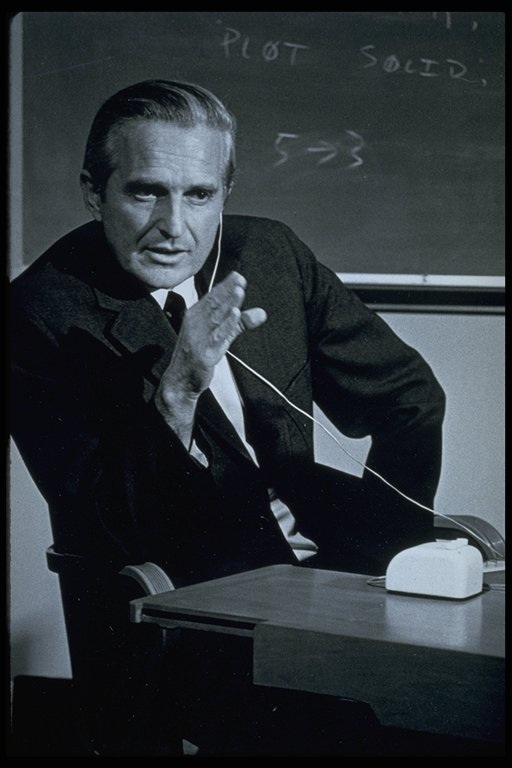Thought Vectors - What Motivated Doug Engelbart
 By "augmenting human intellect" we mean increasing the capability of a man to approach a complex problem situation, to gain comprehension to suit his particular needs, and to derive solutions to problems. Increased capability in this respect is taken to mean a mixture of the following: more-rapid comprehension, better comprehension, the possibility of gaining a useful degree of comprehension in a situation that previously was too complex, speedier solutions, better solutions, and the possibility of finding solutions to problems that before seemed insoluble. And by "complex situations" we include the professional problems of diplomats, executives, social scientists, life scientists, physical scientists, attorneys, designers--whether the problem situation exists for twenty minutes or twenty years. We do not speak of isolated clever tricks that help in particular situations. We refer to a way of life in an integrated domain where hunches, cut-and-try, intangibles, and the human "feel for a situation" usefully co-exist with powerful concepts, streamlined terminology and notation, sophisticated methods, and high-powered electronic aids. 1a1
By "augmenting human intellect" we mean increasing the capability of a man to approach a complex problem situation, to gain comprehension to suit his particular needs, and to derive solutions to problems. Increased capability in this respect is taken to mean a mixture of the following: more-rapid comprehension, better comprehension, the possibility of gaining a useful degree of comprehension in a situation that previously was too complex, speedier solutions, better solutions, and the possibility of finding solutions to problems that before seemed insoluble. And by "complex situations" we include the professional problems of diplomats, executives, social scientists, life scientists, physical scientists, attorneys, designers--whether the problem situation exists for twenty minutes or twenty years. We do not speak of isolated clever tricks that help in particular situations. We refer to a way of life in an integrated domain where hunches, cut-and-try, intangibles, and the human "feel for a situation" usefully co-exist with powerful concepts, streamlined terminology and notation, sophisticated methods, and high-powered electronic aids. 1a1
Man's population and gross product are increasing at a considerable rate, but the complexity of his problems grows still faster, and the urgency with which solutions must be found becomes steadily greater in response to the increased rate of activity and the increasingly global nature of that activity. Augmenting man's intellect, in the sense defined above, would warrant full pursuit by an enlightened society if there could be shown a reasonable approach and some plausible benefits. 1a2
Doug Engelbart Augmenting Human Intellect: A Conceptual Framework. SRI Summary Report AFOSR-3223, October 1962
This week's Thought Vectors in Concept Space assignment is a blog post based on a nugget from the works of Doug Engelbart. I like this quote because Doug talks clearly about what motivates his research; what motivated his life's work.
To me, it's interesting to note that Doug wrote his report in 1962 just as NASA was launching Project Apollo, and not long after President John F. Kennedy announced his challenge to land on the Moon. Project Apollo was arguably the most challenging engineering project of the 20th century, designing and testing families of new engineering systems as well as new classes of hardware. But Project Apollo was more than an engineering project; it was a grand challenge that motivated NASA to do its best and engaged most of the world as spectators in a high stakes, highly visible race to the Moon.
Doug's vision was also an engineering vision, designing and testing new human/computer systems as well as new classes of software. The paragraphs, links, paragraph-grain addresses, relationships, viewspecs and visualizations of Augment/NLS made Doug's thought vectors as real as they could possibly be, recording, linking and animating thoughts in a way that could never be done with paper plans and records. But like Project Apollo, Doug's vision was more than an engineering project; it was and is a grand challenge, to find better ways to enable people to solve critical problems, part of a trail on augmentation started by Vannevar Bush that will never end.
More
Related
Doug Engelbart | 85th Birthday Jan 30, 2010 - Blog post celebrating Doug Engelbart's 85th birthday, includes quotes and links to resources. One of the quotes from Engelbart's talk at the Brown/MIT Vannevar Bush Symposium became the tag line for this VCU course.
DougEngelbart.org: The Doug Engelbart Institute was was conceived by Doug Engelbart to further his lifelong career goal of boosting our ability to better address complex, urgent problems. It contains an excellent history, archive of papers, photos and other published resources as well as links to Doug's current projects.
Video Archive MIT / Brown Vannevar Bush Symposium: A Celebration of Vannevar Bush's 1945 Vision, An Examination of What Has Been Accomplished, and What Remains to Be Done. Oct 12-13 1995, MIT. Talks and panel discussion with Doug Engelbart, Ted Nelson, Andy van Dam, Tim Berners-Lee, Alan Kay and others. See also ACM Interactions summary (free access), transcript of day 1 and day 2 panels.
Augmenting Human Intellect: A Conceptual Framework. by Douglas C. Engelbart, October 1962 (SRI AUGMENT, 3906) A work Doug referred to as the bible of his research agenda, it also outlines the motive for his work: enabling groups of people to respond to the increasingly complex and urgent problems of humanity. If you want to read Doug's original works, start here.
More
- And here's what Enterprise 2.0 looked like in 1968
- Flip Test 1971 | Email versus Journal
- Tricycles vs. Training Wheels
- Enterprise 2.0 Schism
- Traction Roots - Doug Engelbart
- Original Traction Product Proposal
- Shaka, When the Walls Fell Doug on the screen in San Francisco. Dealing lightning with both hands.
- Remembering Doug Engelbart, 30 January 1925 - 2 July 2013

 I18N ERROR: @tsiskin#footer_RSS_Feed
I18N ERROR: @tsiskin#footer_RSS_Feed